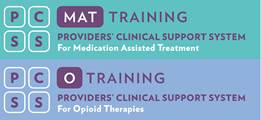More than 1,000 people every day are treated in the nation’s emergency departments for opioid overdose(CDC, 2016). Since 1999, 165,000 people have died from prescription opioid overdose. Deaths from heroin and fentanyl have risen sharply in the past two years, all at a cost of $55 billion per year in health and social costs (U.S. Department of Health and Human Services, 2016). Despite these grim and disheartening statistics, there is positive work being done to put an end to the opioid use disorder epidemic.
In an effort to mitigate the number of overdoses and deaths, healthcare organizations around the country are working together in a powerful coalition through two projects geared toward training primary healthcare providers to treat those with opioid use disorder (OUD), as well as identify those at risk of developing OUD.
 In response, SAMHSA funded two projects to address this healthcare crisis: Providers’ Clinical Support System for Medication Assisted Treatment (PCSS-MAT) and Providers’ Clinical Support System for Opioid Therapies (PCSS-O). Both projects provide a wide array of no-cost, evidence-based educational resources and trainings with clinical expert mentorship to support primary care providers to effectively treat their patients with substance use disorders, specifically OUD.
In response, SAMHSA funded two projects to address this healthcare crisis: Providers’ Clinical Support System for Medication Assisted Treatment (PCSS-MAT) and Providers’ Clinical Support System for Opioid Therapies (PCSS-O). Both projects provide a wide array of no-cost, evidence-based educational resources and trainings with clinical expert mentorship to support primary care providers to effectively treat their patients with substance use disorders, specifically OUD.
In the coming months, the Addiction Technology Transfer Center (ATTC) Network's regional centers will be critical in making multidisciplinary training opportunities available to clinicians. The ATTC Network is a PCSS-O partner and a member of the PCSS-MAT Steering Committee. The PCSS Projects have been working with the Network to provide educational resources and training for allied health professionals on PCSS-MAT and PCSS-O.
PCSS-O focuses on OUD and the interface of OUD and chronic pain. PCSS-MAT targets the need to train healthcare providers to treat substance use disorders, particularly OUD, with a combination of behavioral therapy and medications. The three FDA-approved medications —methadone, naltrexone, and buprenorphine—combined with therapy, have been clinically proven to increase a patient’s chances of recovery. Research supports medication-assisted treatment, which is widely considered the most effective way to treat OUD.
A coalition of national healthcare organizations
Both projects are made up of a coalition of national healthcare organizations (see lists below) and have been working for years to train primary healthcare providers through a variety of methods, including live and archived webinars, online modules, videos, case vignettes, etc. All courses are provided at no cost and many include CME.
One major effort underway is geared toward increasing the number of primary care providers who are waivered to prescribe buprenorphine. According to SAMHSA (2017), slightly more than 36,000 physicians are waivered to prescribe buprenorphine for the treatment of OUD, but less than half prescribe the medication at all. In an effort to increase the numbers of primary care providers treating OUD, the Comprehensive Addiction and Recovery Act was passed to include nurse practitioners (NPs) and physician assistants(PAs) to its list of providers eligible to apply for a waiver. PCSS-MAT is expected early this month to launch its eight-hour MAT waiver training course for NPs and PAs and an additional 16 hours of specified training to meet the 24 hours of training required to be eligible to apply for a waiver to prescribe buprenorphine.
Learn more about PCSS-MAT’s eight-hour MAT waiver training course.
In addition, the projects have a series of podcasts, which give clinicians a solid overview of preventing and treating OUD in the primary care setting. The podcasts, conducted by leaders in the field of treating pain and OUD, include such topics as:
One of the unique aspects of the projects is the mentoring/clinical coaching programs, which give providers access to experts in the fields of addiction and pain. See PCSS-MAT mentoring program and PCSS-O coaching program. Clinical experts are paired with clinicians in a variety of ways including:
The mentoring programs are not meant to offer medical advice about specific patients, but are designed for experts to provide general information to clinicians about evidence-based clinical practices. This resource is one component of a large repository of educational and mentoring services available at no cost for providers.
PCSS-O Coalition: Led by the American Academy of Addiction Psychiatry, includes the Addiction Technology Transfer Center Network; American Academy of Neurology; American Academy of Pain Medicine; American Academy of Pediatrics; American College of Physicians; American Dental Association; American Medical Association; American Osteopathic Academy of Addiction Medicine; American Psychiatric Association; American Society for Pain Management Nursing; International Nurses Society on Addictions; and Southeastern Consortium for Substance Abuse Training.
PCSS-MAT Coalition: Led by American Academy of Addiction Psychiatry, includes American College of Emergency Physicians; American College of Physicians; American Psychiatric Association; American Osteopathic Academy of Addiction Medicine; American Society of Addiction Medicine; Association for Medical Education and Research in Substance Abuse; and the National Association of Drug Court Professionals.
Funding for this initiative was made possible (in part) by Providers' Clinical Support System for Opioid Therapies (grant no. 5H79TI025595) and Providers' Clinical Support System for Medication Assisted Treatment (grant nos. 5U79TI024697 and 1U79TI026556) from SAMHSA. The views expressed in written conference materials or publications and by speakers and moderators do not necessarily reflect the official policies of the Department of Health and Human Services; nor does mention of trade names, commercial practices, or organizations imply endorsement by the U.S. Government.
References
Centers for Disease Control and Prevention. Prescription Opioid Overdose Data. https://www.cdc.gov/drugoverdose/data/overdose.html
Health and Human Services. The Opioid Epidemic: By the Numbers
https://www.hhs.gov/sites/default/files/Factsheet-opioids-061516.pdf
Substance Abuse and Mental Health Services Administration (SAMHSA). Medication-Assisted Treatment, Physician and Program Data.
https://www.samhsa.gov/programs-campaigns/medication-assisted-treatment/physician-program-data